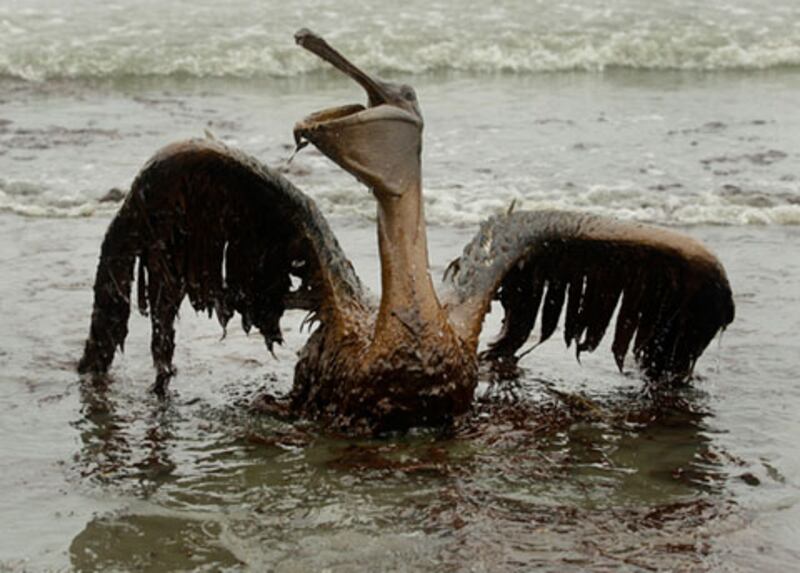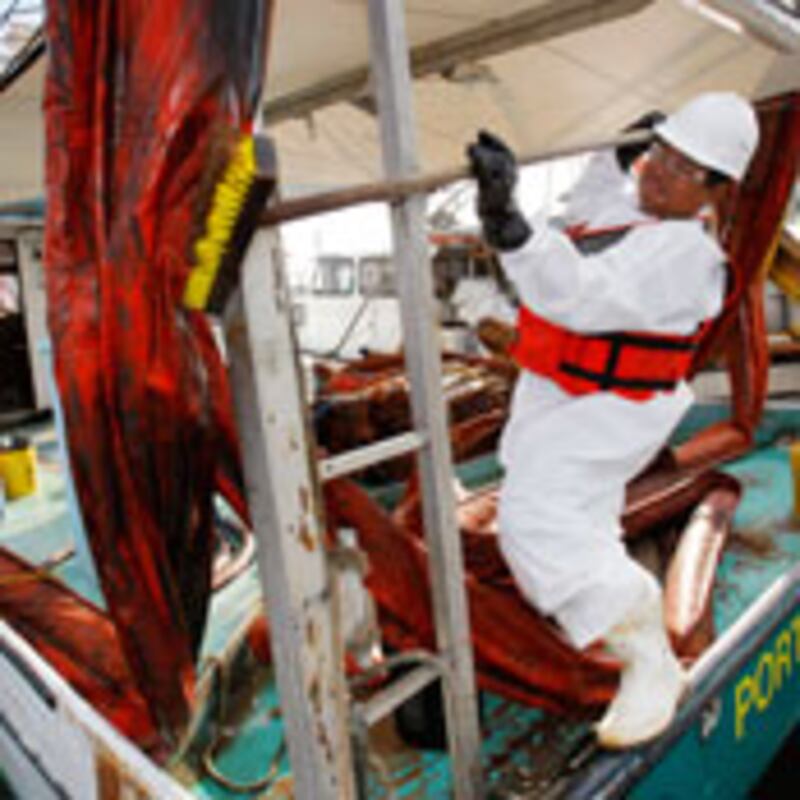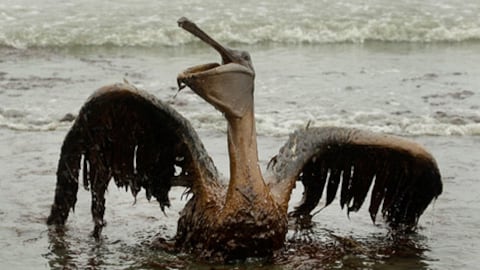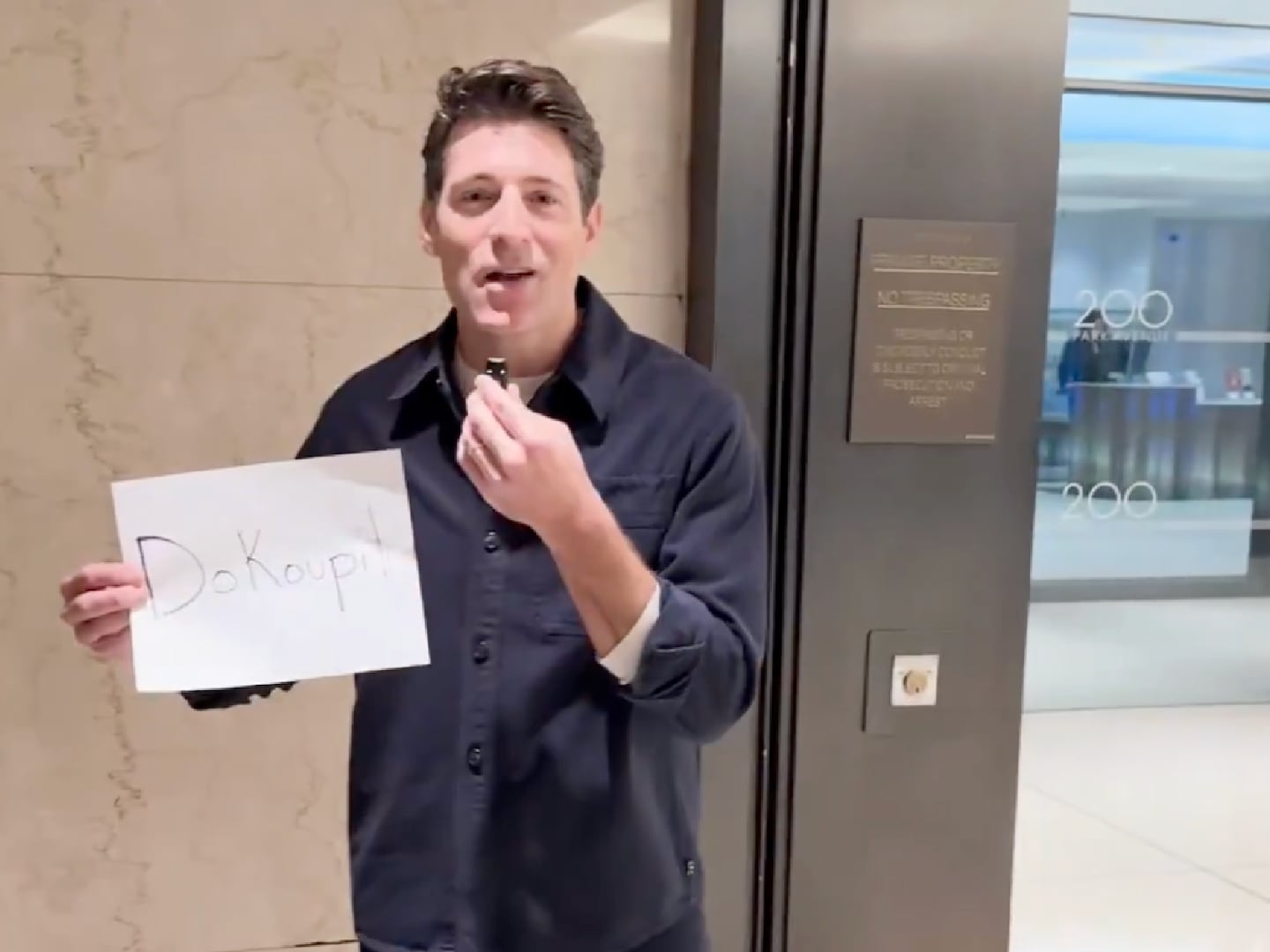There’s up the road and there’s down the road. That’s how people give directions here in Venice, Louisiana, where, just over a month ago, the Deepwater Horizon oil rig went down 50 miles off the coast, creating the most disastrous spill in American history.
There is no post office. No grocery store. No Chamber of Commerce—those were all wiped out by Hurricane Katrina and have never been rebuilt.
Click Image to See Dramatic Photos and Video of the Spill

Local officials are also scarce amenities, and when people call up Captain Keith Kennedy of Born to Fish Charters, and ask how to reach the mayor, Kennedy replies, “Speakin’.”
Joking around is the way people in this southern stretch of one of the country’s most battered states deal with crisis. They pride themselves on being tough and resilient, qualities that were tested as never before five years ago with Katrina.
But people like Kennedy, whose livelihood—and, indeed, entire life—is fishing, are having trouble drawing on their Just-Deal-With-It reserves, in the face of recent news that BP’s latest “ top kill” effort was ineffective and the oil spill may continue into August. The news is especially dire, seeing as hurricane season officially began on Tuesday.
For now, real estate isn’t a bad business. Trailer homes are renting for $9,000 a month, up from $1,500 to $2,000 pre-disaster. And media organizations will pay fishermen $200-$375 an hour to go out in search of oil-drenched booms.
“August? This means the end of the world,” Kennedy said one recent morning, looking up from a mug of black coffee, which, along with “a couple—or more” packs of Marlboro Lights, was all he subsisted on until dinner time, when he sat down to a bowl of crawfish étoufée and a piece of buttered bread.
The news only reaffirmed that “there’s no light at the end of the tunnel at this point in time,” said Kennedy, whose other running joke is that he’s worked as a stunt double for Tommy Lee Jones, to whom he bears a more than passing resemblance. “At least with Katrina, you knew you could rebuild, you knew you could start fishing at some point.”
(Full disclosure: Kennedy is my second cousin. I was supposed to be in the area for a family reunion, which was canceled due to the oil spill.)
In the last month, Kennedy’s life has been turned around, as it has been for all the charter boat operators, shrimpers, oystermen, crabbers, and hordes of sports fishermen who descend on this fishing paradise year-round, but especially this time of year, when the weather is fine (or at least sufferably hot) and the speckled trout have spawned. Seafood is a $2.4 billion-a-year business in Louisiana, and much of it comes from the shores off Lower Plaquemines Parish, where Venice is located.
With virtually all fishing areas off limits, Kennedy—who is already losing more than $14,000 in revenue this summer due to cancelled charter expeditions—has had to reinvent himself. Instead of heading out to his favorite fishing spot, Hole #1 in South Pass, one of the main waterways to the Gulf of Mexico, he spends his days taking reporters down river to look at damaged beaches. Or he works the phones, setting up residential leasing agreements with hundreds of employees from BP, the Coast Guard, and environmental corporations, who are being sent to Venice and nearby Boothville to assist with the cleanup. (His cellphone bill, normally $46 a month, shot up to $285 in May.)
The massive influx is changing the face of Venice. There are gravel parking lots where there was just dirt before, “tent cities” have sprung up, and there’s suddenly something like traffic in a town that still hasn’t regained its footing, or its population, since Katrina. “They’re buildin’ a community center, but there’s no community anymore,” Kennedy remarked one afternoon, as we drove in his truck down Hwy. 23, past the remains of the old grocery store, and blown-out, rusty buildings still marred with water marks 10 feet high.
For now, real estate isn’t a bad business. Trailer homes are renting for $9,000 a month, up from $1,500 to $2,000 pre-disaster. And media organizations will pay fishermen $200-$375 an hour to go out in search of oil-drenched booms, of which there are miles, and harmed wildlife.

“Nothing delights their hearts more than seeing a dead bird,” Kennedy says dryly. “What they’re dyin’ to see, is the last thing I want to see.”
But what happens when everyone goes back home, and people like Kennedy are left with what is becoming a devastated, and very possibly ruined, environment?
“When you take away a fisherman’s net or his hooks, or, in this case, you take away the fish, then he’s lost. He’s just lost, you know.”
Visits from politicians aren’t helping matters. President Obama’s speech at Grand Isle last week has been widely considered a “dog and pony show” by residents, who say he’s no better, no worse than George W. Bush. The only political heroes, as far as anyone here is concerned, are Gov. Bobby Jindal and Plaquemines Parish President Billy Nungesser, who have been highly visible, and highly vocal, about a disaster that many see as worse than Katrina, given its still-unknown outcome.
“Billy’s been very involved,” Kennedy said. “You might find him out stacking sand bags himself or running an airboat. The man’s just trying to do everything and anything humanly possible to save the environment and the jobs and the people of Lower Plaquemines Parish.”
Ditto for Jindal, whom Kennedy calls “another passionate politician, which is rare in the state of Louisiana—extremely rare.”
The two men have formed a kind of Mutt and Jeff alliance in recent weeks, and on Tuesday travelled to New Orleans for a press conference about a proposed plan to create an 80-mile stretch of barrier islands around the Louisiana shore’s precious wetlands. Nothing is more sacred to fishermen than marshes, which are fast deteriorating, even without the threat of oil, and which create the most valuable part of the fishery. “It’s where baby fish grow up before they’re strong enough to handle the waters of the Gulf,” Kennedy explained. But though Jindal and Nungesser proposed the idea three days after the oil spill, it has been met with resistance from the Army Corps. of Engineers and the EPA.
At the press event, as the trim and polished Jindal spoke eloquently and rapidly—“We don’t have time. That oil is in our marsh”—Nungesser, a large, hulk of a man, who has a more Everyman appeal, sat in the audience nodding along. Midway through Jindal’s speech, Nungesser burst into applause. Later, he gave his own impassioned speech, sputtering into the microphone, “This is a pass/fail test. It’s not multiple choice. It’s not an essay.”
The politician’s sense of urgency is in marked contrast to that of Obama, who, locals say, hasn’t spent enough time in the area. (The visit to Grand Isle was his second visit.) Noel Bunol, who’s been coming down to Venice to fish since he was 5, said, “He oughta get in a flat boat, and go down the river in a pair of white shrimp boots. He oughta get there and look and touch and smell that oil. Because sitting on a clean beach at a podium doesn’t do it justice.” (Shrimp boots are to the oil spill disaster what hard hats were to 9/11: a symbol of commitment, sweat, and dogged resolve by those who wear them.)
Kennedy is more generous toward the president, saying, “I’m sure Obama is probably doing the best he can do. It’s a totally out-of-control situation, and I believe even his hands are tied by the bureaucratic mess this country is in.”
Point in case is the stalled barrier island plan, a situation that has Kennedy and others so frustrated that they had planned on staging an “armada” on Memorial Day to protest. The idea was to have more than 5,000 boats line up across the Mississippi River and prevent commercial boats from passing. (When I was first told about it, several days ago, Kennedy advised me to “bring bail money”—stopping traffic on the river is an act of treason.) But in the end, the protest was postponed because of how high and dangerous the river has become. It was also decided that the protest would be more effective were it staged during Obama’s next visit.
Asked why he didn’t seem more worried about the illegality of the act, Kennedy said, “At this point in time, if that’s what it takes to get the federal government’s attention, I don’t know anybody who’s not willing to step up. Everyone’s fed up. And everyone’s response was, ‘Let me know when and where, I’ll be there.’”
Nicole LaPorte is the senior West Coast reporter for The Daily Beast and the author of The Men Who Would Be King: An Almost Epic Tale of Moguls, Movies, and a Company Called DreamWorks.






